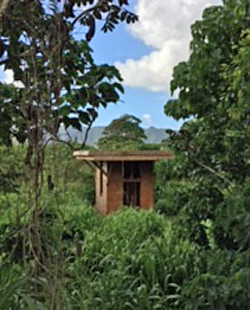
Kauaʻi Community College’s 10×12 foot tiny house rests in lush greenery just above a flume of clean flowing water built by Grove Farm and the campus’ loʻi.
“The house framing is up, the side panels are up and most of the roof is up as well,” said Carpentry Instructor Justin Carvalho, who has been working with students in the carpentry and facilities engineering, and electrical installation and maintenance programs to build a house based on renewable energy and sustainability using alternative materials.
Carvalho and his students are striving to build a home that would be affordable to construct and would promote healthy green living in communities. They applied basic construction skills to reuse local and abundant materials and integrate compactness with multi-functional living.
Carvalho said he wanted to “challenge the public to to think about how we can live with more sustainability in the future.“ He assembled sustainability-minded members from the County of Kauaʻi, Kauaʻi CC and construction industry professionals to design the unique project. “Kauaʻi is our home and we are committed to protecting and nourishing it for now and the future,” he said.
Tiny and efficient

The roof of the tiny house will be a green garden and the house will have a pond to grow local plants. It will be a “no maintenance garden,” said Carvalho. It will also have a compost toilet system with a full bath, shower and kitchen, and the top floor will contain beds and storage.
The Kauaʻi CC tiny house will be powered by the campus hydro-electric station that produces DC energy, which will charge the battery bank to use an inverter to convert DC to AC energy. Leading this phase is Daniel Erickson, the instructor who teaches the sustainable science management course in basic energy production, wastewater management and culinary sustainability. “I am very excitied about what we are doing,” Erickson said. “We are making one micro self-contained grid.”
James Andrews, Kauaʻi CC instructor and his electrical installation and maintenance technician program students will be installing the electrical utility and house wiring. “The best thing our students are learning is to work together with other trades to successfully complete a project,” Andrews said.
The tiny house project is supported by generous donations to the college to promote a healthy Kauaʻi. Construction is slated to be completed fall 2017.
“Anything we can do to enhance a healthy and robust lifestyle on Kauaʻi is part of our mission,“ said Kauaʻi CC Chancellor Helen Cox. “Our tiny house project is a perfect fit,“ she said.
—By Camilla Matsumoto

